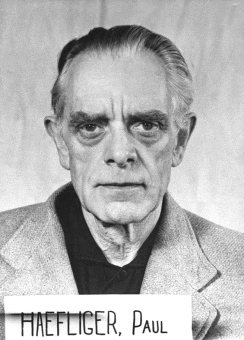Paul Friedrich Häfliger (1886–1950)

© National Archives, Washington, DC
“I was always appalled by the ruthless political measures of the Nazi regime: the racial hatred and the persecution of the Jews, especially in connection with the Nuremberg Laws, the institution of the Gestapo, which filled everyone with fear and insecurity, the suppression of justice and the suppression of the churches, and in the economic sphere, the increasingly strong controls, which impeded any free business activities.”[1]
Paul Friedrich Häfliger was born on November 19, 1886, in Steffisburg near Bern. He was the son of the merchant and Bolivian Consul General Johann Friedrich Häfliger and his wife, Anna (née Schumacher). After attending school in Bern, he entered the Ecole de Commerce Supérieure in Neuchâtel in 1903 and finished the program in 1905. After that, he worked as a salesman for several firms. In addition, he made trips for the Swiss Institute for Sera and Vaccines. In 1909, he joined the Chemische Fabrik Griesheim-Elektron as a sales correspondence clerk. In 1914, he became an authorized signatory, and in 1915 he was made head of the War Commission for Acids in Berlin. In 1924, he was promoted to deputy manager of the Griesheim plant. After the formation of the conglomerate I.G. Farben AG, he was made an alternate member of the managing board in 1926. At the same time, he took over the management of heavy chemicals sales within the Chemicals Sales Group (VG Chemikalien). From 1937 on, Häfliger was a member of I.G. Farben’s Chemical Committee and Commercial Committee, and in 1938 he became a full member of the board.
He was arrested by the U.S. Army for the first time in 1945, and then again in 1947. The same year, he was a defendant in the I.G. Farben Trial in Nuremberg, and in 1948 he was sentenced to two years in prison for “plunder and spoliation,” specifically with regard to Norwegian companies.
















